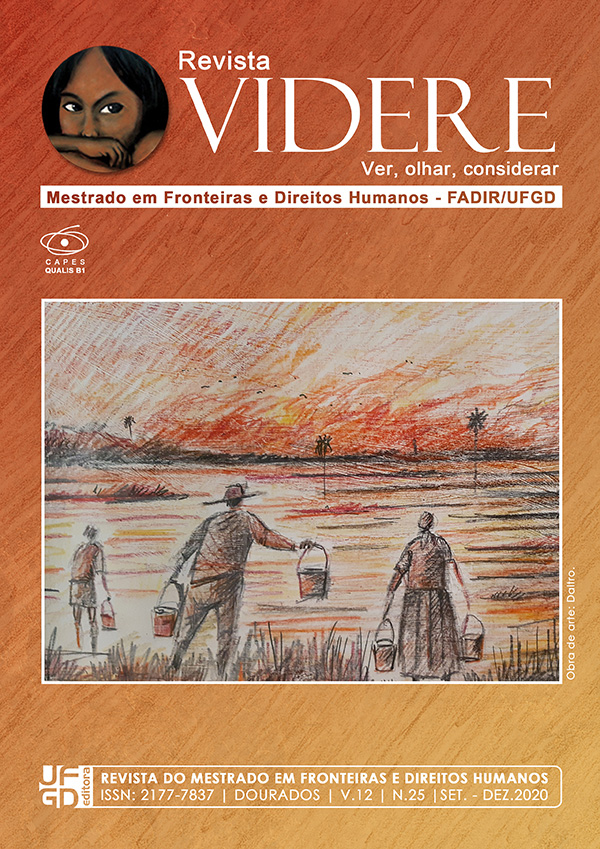Relações fronteiriças: reflexões sobre polissemia, dinamismo, conflitos e multiculturalismo
DOI:
https://doi.org/10.30612/videre.v12i25.11768Palavras-chave:
Semântica. Discurso. Polissemia. Multiculturalismo. Fronteira.Resumo
Partindo do pressuposto de que a ciência jurídica é um campo complexo e abrangente, concebido não apenas em sua perspectiva legal, mas, também, como objeto do campo cultural, ultrapassando limites do positivismo jurídico, o presente artigo tem por objetivo discutir as dimensões epistemológicas das relações fronteiriças. Para tal, empreendemos uma reflexão acerca das acepções do termo fronteira, buscando demonstrar que uma visão ampliada das relações fronteiriças no âmbito do Direito pode favorecer a adoção de um compromisso ético no exercício profissional, o cotejamento de doutrinas e jurisprudências, bem como uma compreensão assertiva dos/nos diferentes contextos sociais. O nosso estudo se constitui por uma pesquisa teórica, organizada em dois momentos. No primeiro momento, problematizamos a constituição polissêmica do termo fronteira, com vistas a demonstrar as potencialidades de sentidos. No segundo momento, abordamos a dimensão multicultural das relações fronteiriças e sua relevância para a ciência jurídica. A partir do estudo empreendido, ressaltamos que as relações fronteiriças podem trazer contribuições substanciais para o campo do Direito, uma vez que é possível ampliar posicionamentos, dinamizar interpretações e promover a justiça, evitando abordagens redutoras e dissociadas da engrenagem social.
Downloads
Referências
ÁGUAS, Carla Ladeira Pimentel. A tripla face da fronteira: reflexões sobre o dinamismo das relações fronteiriças a partir de três modelos de análise. Fórum Sociológico [Online], 23 | 2013, posto online no dia 09 janeiro 2014. Disponível em: https://journals.openedition.org/sociologico/842. Acesso em: 25 fev. 2020.
ALBUQUERQUE, José Lindomar C. A dinâmica das fronteiras: deslocamento e circulação dos "brasiguaios" entre os limites nacionais. Horiz. antropol. vol.15 no.31 Porto Alegre Jan./Jun. 2009. Disponível em: http://www.scielo.br/scielo.php?script=sci_arttext&pid=S0104-71832009000100006. Acesso em: 01 março 2020.
ALMEIDA, Guilherme Assis de; BITTAR, Eduardo C. B. Curso de filosofia do direito. 10. ed., São Paulo: Atlas, 2012.
BENTIVOGLIO, Julio. A história conceitual de Reinhart Koselleck. Dimensões, vol. 24, 2010, p. 114-134. Disponível em: file:///C:/Users/adiministrador/Downloads/2526-Texto%20do%20artigo-3946-1-10-20120307%20(1).pdf. Acesso em: 25 fev. 2020.
COTANDA, Fernando Coutinho. A polissemia dos conceitos e suas implicações para a sociologia: os usos do termo “sistema”. Disponível em: http://www.scielo.br/pdf/es/v35n128/0101-7330-es-35-128-00829.pdf. Acesso em: 01 março 2020.
Dicionário Michaelis da Língua Portuguesa (2020). Fronteira.
. Disponível em: https://michaelis.uol.com.br/moderno-portugues/busca/portugues-brasileiro/fronteira/. Acesso em: 26 fev. 2020.
DINIZ, Maria Helena. Compêndio de Introdução à Ciência do Direito: Introdução à Teoria Geral do Direito, à Filosofia do direito, à Sociologia Jurídica e à Lógica jurídica. Norma jurídica e Aplicação do Direito. 20. ed. São Paulo: Saraiva, 2009.
FERRARI, Maristela. As noções de fronteira em Geografia. Unioeste, v. 9, n. 10, 2014. Disponível em: http://e-revista.unioeste.br/index.php/pgeografica/article/viewFile/10161/7550. Acesso em: 29 fev. 2020.
FRIEDMAN, S. O falar da fronteira, o hibridismo e a performatividade: teoria da cultura e identidade nos espaços intersticiais da diferença. Revista Crítica de Ciências Sociais, 61, 2001, p. 5-28.
HAESBAERT, R. (2004). Dos múltiplos territórios à multiterritorialidade. In Anais do I Seminário Nacional sobre Múltiplas Territorialidades. Porto Alegre: Programa de Pós-graduação em Geografia da UFRGS. Disponível em: http://www.ufrgs.br/petgea/Artigo/rh.pdf. Acesso em: 06 março 2020.
HANNERZ, Ulf. Fluxos, fronteiras, híbridos: palavras-chave da antropologia transnacional. Mana, 3(1):7-39, 1997, Disponível em: http://www.scielo.br/scielo.php?script=sci_arttext&pid=S0104-93131997000100001. Acesso em: 06 março 2020.
JASMIN, Marcelo Gantus. História dos conceitos e teoria política e social: referências preliminares. Disponível em: http://www.scielo.br/scielo.php?pid=S0102-69092005000100002&script=sci_abstract&tlng=pt. Acesso em: 29 fev. 2020.
KERN, A. A. Fronteira/fronteiras: conceito polissêmico, realidades complexas. Disponível em: https://periodicos.unemat.br/index.php/historiaediversidade/article/view/1617. Acesso em: 01 março 2020.
KERN, A. A. Missões: uma utopia política. Porto Alegre: Mercado Aberto, 1982.
LACOSTE, Y. A Geografia: isso serve, em primeiro lugar, para fazer a guerra. Campinas: Papirus, 1988.
MACHADO, Lia Osório. Limites, Fronteiras, Redes. In: STROHAECKER, Tânia Marques. et al. (Org.). Fronteiras e Espaço Global. Porto Alegre: AGB-Seção Porto Alegre, 1998.
MARQUES, Maria Helena Duarte. Iniciação à Semântica. 7. ed. atual. São Paulo: Zahar, 2011. 180 p.
MARTINS, José de Souza. Fronteira. A degradação do outro nos confins do humano. São Paulo: Hucitec, 1997.
ORLANDI, Eni Puccinelli. Análise do discurso: princípios e procedimentos. Campinas: Pontes, 2000.
POCOCK, J. G. Linguagens do ideário político. São Paulo: Edusp, 2003.
SANTOS, C. R. S. Sobre limites e fronteiras: a reprodutibilidade do estoque territorial para os fins da acumulação capitalista. Disponível em: https://journals.openedition.org/confins/7081?lang=pt. Acesso em: 08 março 2020.
SOUSA SANTOS, B. de. Reconhecer para libertar: os caminhos do cosmopolitismo multicultural. Rio de Janeiro: Civilização Brasileira. 2003.
SOUZA, M. J. L. O território: sobre espaço e poder, autonomia e desenvolvimento. In I. E. Castro, & R. L. Corrêa (Eds.), Geografia: conceitos e temas. Rio de Janeiro: Bertrand Brasil, 2003.
VANDENBERGHE, Frédéric. Um estado para o cosmopolitismo. Novos estud. – CEBRAP, n. 90, São Paulo, July/2011, p. 85-101. Disponível em: http://www.scielo.br/scielo.php?script=sci_arttext&pid=S0101-33002011000200007. Acesso em: 05 março 2020.
VIRILIO, Paul. O espaço crítico. Rio de Janeiro: Ed. 34, 1999.
Downloads
Publicado
Como Citar
Edição
Seção
Licença
Os autores devem aceitar as normas de publicação ao submeterem a revista, bem como, concordam com os seguintes termos:
(a) O Conselho Editorial se reserva ao direito de efetuar, nos originais, alterações da Língua portuguesa para se manter o padrão culto da língua, respeitando, porém, o estilo dos autores.
(b) Autores mantém os direitos autorais e concedem à revista o direito de primeira publicação, com o trabalho simultaneamente licenciado sob a Atribuição-NãoComercial-CompartilhaIgual 3.0 Brasil (CC BY-NC-SA 3.0 BR) que permite: Compartilhar — copiar e redistribuir o material em qualquer suporte ou formato e Adaptar — remixar, transformar, e criar a partir do material. A CC BY-NC-SA 3.0 BR considera os termos seguintes:
- Atribuição — Você deve dar o crédito apropriado, prover um link para a licença e indicar se mudanças foram feitas. Você deve fazê-lo em qualquer circunstância razoável, mas de nenhuma maneira que sugira que o licenciante apoia você ou o seu uso.
- NãoComercial — Você não pode usar o material para fins comerciais.
- CompartilhaIgual — Se você remixar, transformar, ou criar a partir do material, tem de distribuir as suas contribuições sob a mesma licença que o original.
- Sem restrições adicionais — Você não pode aplicar termos jurídicos ou medidas de caráter tecnológico que restrinjam legalmente outros de fazerem algo que a licença permita.



















